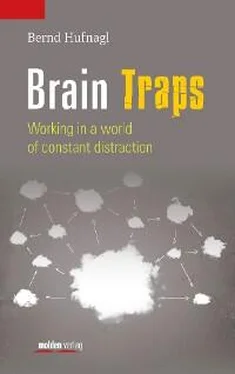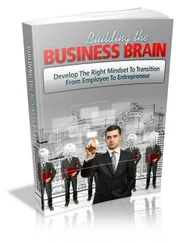Bernd Hufnagl

Working in a world
of constant distraction

COVER
TITLE Bernd Hufnagl Working in a world of constant distraction
PROLOGUE
CHAPTER 1: THE LOGIC OF OUR BRAIN
FROG, AGGRESSION, AND IMPULSE CONTROL
SHREWS, MEMORY, EMOTION, AND MOTIVATION
CONTROLLER, CONSCIOUSNESS, REASON AND LANGUAGE
INADEQUATE MEMORY
CHAPTER 2: STRESS AND INNER RESISTANCE
LEARNED HELPLESSNESS
PROCESSING, STANDBY, OR OFFLINE MODE
STRESS AND AUTONOMIC CONTROL
LINKED EXPERIENCES AND INNER CONVICTION
CONTROLLABLE AND UNCONTROLLABLE STRESS
INNER RESISTANCE: RESILIENCY OR VULNERABILITY?
CHAPTER 3: WORK AND OUR ABILITY TO PERFORM UNDER PRESSURE
IS JOB BURNOUT JUST A FAD?
DEFINITION AND CORE CRITERIA FOR BURNOUT AT WORK
SALUTOGENISIS
FERTILE GROUND FOR EXCESSIVE STRESS
PRESENTEEISM
CHAPTER 4: WORKING IN MULTITASKING MODE
A TYPICAL WORKING DAY
WORK DISRUPTIONS
MULTITASKING: SHOULD WE DO EVERYTHING SIMULTANEOUSLY, OR SHOULD WE DO ONE THING AT A TIME?
THE EFFECTS OF PERMANENT DISTRACTION AND CHRONIC MULTITASKING
DOES MULTITASKING OFFER ANY BENEFITS?
CHAPTER 5: BRAIN FRIENDLY EMPLOYEE MANAGEMENT
THE EVOLUTION OF LEADERSHIP
MANAGEMENT AND HERD BEHAVIOR
ACCEPTANCE OF LEADERSHIP
PERFORMANCE AND OPTIMISM
COMMUNICATION
APPRECIATION AND MULTITASKING
DELEGATING
CHAPTER 6: MOTIVATION, DECISIONS, AND THE WILLINGNESS TO CHANGE
MOTIVATION AND MEMORY
DECISIONS: A COMPETITION BETWEEN FROG, SHREW, AND CONTROLLER
FREE WILL
DO WE DECIDE WITH OUR GUT OR WITH OUR BRAIN?
BIOLOGICAL DECISIONS
THE WILLINGNESS TO CHANGE
EPILOGUE
LITERATURE
IMPRINT
Have you ever been reading a book for a while, only to realize that you didn’t have the faintest idea what you had read for the last ten minutes? My guess is that you know exactly what I’m talking about. Or perhaps you have found yourself in the following situation: You’re sitting at the breakfast table reading the newspaper. You read the headline and the first two sentences of an article. Then, all of a sudden, you find yourself in the middle of the next article without knowing how you got there. You continue reading the rest of the newspaper in the same vein, unconsciously scanning and skipping from one article to another. This is referred to as executive reading and for many managers it’s a point of pride that their brain has the capacity to scan innumerable documents and e-mails at an impressive speed. What’s more, they even believe that they are able to fully grasp and retain the main ideas of the articles they have skimmed over. Perhaps it’s possible.
Another common occurrence, both in the business world and in everyday life, is what is referred to as executive listening . For instance, let’s say a person is carrying on a conversation with a colleague or co-worker and during the conversation (you can probably guess where I’m headed), they find themselves thinking about something completely different. You might ask yourself why this tends to happen? The reason is that, mentally, we have already moved on and now, since the conversation is still going on, have to act as if we were still listening for the sake of appearance. The ability to immediately “know” or anticipate what someone is going to say is referred to as executive listening. This ability involves making premature and often hasty judgments based on our own life experiences. This practice is vastly different from the ability to patiently and attentively listen to someone with the intent of truly understanding them. A good CEO understands the value of listening as the first necessary step in making correct decisions. But is he aware that children are not the only ones plagued by attention deficit/hyperactivity disorders? The inability to fully focus on just one thing is a problem of increasing magnitude in today’s business world.
Working with a second screen has already become a well-established trend. Many of us have become accustomed to surfing the internet and checking our e-mails, messages, WhatsApp, Facebook, and Twitter accounts while simultaneously watching television. Our brain has already learned to adapt to these new challenges. I’m sure that some of these developments are cause for celebration. After all, today’s young text message champions can definitely type faster than most fifty-year-olds. They also make fewer typing mistakes because the brain area that is responsible for controlling the thumb has measurably increased! At the airport recently I had the pleasure of watching a young Japanese woman hastily writing a message on her smartphone. It was very impressive indeed to watch someone produce so much text in such a short period. I’m fairly certain that I can’t even speak as quickly as she could type, and believe me, I can speak very quickly. On the other hand, one might ask oneself just how important this skill really is. After all, it looks like the use of voice navigation for controlling and communicating with our devices is just around the corner.
One very positive finding is that surgeons who frequently play computer games in their leisure time are able to perform operations using computerized systems measurably better than their colleagues. It seems that their ability to perceive space on a two-dimensional computer screen is more pronounced. Playing video games appears to sharpen the skills surgeons draw on while operating, and for that reason I advise all surgeons to head to the game console. These studies are all very interesting, but I think it would be wise to apply the results of our brain research to today’s business world. We will be looking at the influence of technology on our ability to focus, and examining a few advantages as well as some well-documented drawbacks that today’s customary way of working entails. Unfortunately, many people in today's business world are not operating under “brain-compatible” conditions. In this book, I will illustrate and explain what brain-compatible conditions are, and how they are connected to our body's “reward system”, and to our memory. I will also shed some light on the effects of work interruptions, distractions, multitasking, and our declining willingness to change. The effects of working under incompatible brain conditions are already apparent. Mental illness seems to be increasing as rapidly as resiliency seems to be decreasing. Stress and burnout are becoming threateningly commonplace, and all too often remain undifferentiated.
I find this astounding, because after all, objectively and geographically speaking, we are living in a historically unparalleled state of prosperity and security. We need to ask ourselves if perhaps we have not become so spoiled that we are no longer willing or able to relinquish – even in part – certain privileges we believe we’ve earned and that we’ve come to take for granted. Or do we have to accept the hypothesis that our business world is simply not able to provide appropriate conditions for a healthy working environment? Are managers and employees victims of the “system”, or are we, as individuals, responsible for establishing brain-compatible working conditions?
I submit that we need a better measurement of performance! The very nature of our success-oriented culture inevitably exacerbates the problem of declining personal resiliency and personal performance, due to the fact that the success of the system is always rewarded first and foremost. That’s not a negative thing in and of itself; however, it does raise the question as to whether it allows each individual to emotionally recognize and experience their small day-to-day achievements.
Читать дальше














